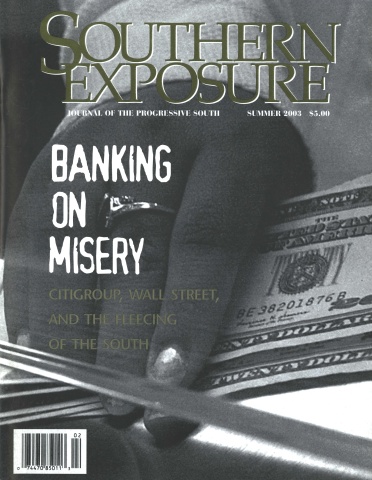The New Loan Sharks

This article first appeared in Southern Exposure Vol. 31 No. 2, "Banking on Misery." Find more from that issue here.
Marjorie Reese wondered if there was “crookedness in it.” She was signing for a loan at a CitiFinancial branch in Montgomery, Ala. Reese was a single mom and kindergarten teacher. She didn’t make a lot of money. Her credit record wasn’t great. How in the world could CitiFinancial put money into her hands so quickly?
But Reese needed the cash. She put her trust in CitiFinancial.
“They make you feel you’re really special,” she says. “I guess I signed about 20 pages of stuff. They always act as if they’re in a hurry. . . . I got caught up in all that signing.”
Only later, Reese maintains, did she realize the swift “sign here, sign there” ease of the loan closing masked some unpleasant details: an annual interest rate of 30.0 percent and a $959 charge for credit insurance, a pricey addition to a loan of $3,565. Reese insists she knew nothing about the insurance on that loan, or about the $2,488 she paid to cover insurance on a $6,200 refinancing seven months later.
Like millions of Southerners, Marjorie Reese had been ensnared by a “subprime” lender—one of a burgeoning “poverty industry” of finance companies, pawnshops, and other financial businesses that target consumers made vulnerable by discrimination and financial need.
These consumers struggle in a marketplace that has two sets of rules: one for “prime” borrowers who pay competitive rates, and one for “subprime” borrowers who are marked for high prices and questionable sales tactics.
A decade ago, Southern Exposure became the first news organization in the country to take an in-depth look at how Wall Street was profiting from predatory loans targeted at low-income, blue-collar, and minority consumers. Sad to say, since the publication of that Fall 1993 cover story, “Poverty, Inc.,” things have gotten worse.
Subprime mortgage lending, for example, has grown more than 500 percent in less than a decade, from $34 billion in 1994 to $213 billion in 2002. “Payday lenders”—storefront operations that offer small loans at interest rates as high as 400 percent—have grown from an uncounted scattering in the mid-1990s to a 25,000-strong multitude today.
Some of corporate America’s biggest names—including CitiFinancial’s parent, Citigroup—have pushed their way into the market, using their capital and clout to sustain investor enthusiasm and legal sanction for unfair and unsavory practices. They’ve found a rich market in the South, where economic inequality, racial discrimination, weak consumer laws, and pliable regulators create a ripe atmosphere for abuse. Federal and state governments have largely backed away from policing the marketplace, and corporate consolidation and innovations in technology, credit products, and marketing have provided Wall Street with a generous influx of cash at a time when old-fashioned ways of making money—buying and selling goods, for example—seem increasingly outdated.
America has been transformed by a top-down financial revolution, one that’s targeting folks on the bottom half of the nation’s income ladder. It’s easy, Wall Street has learned, to make money off people desperate for cash. As Marjorie Reese says, “People who need money, where will they go? They trap you that way.”
This special section documents how these traps are laid, and how citizens are fighting back, pushing for justice through a combination of litigation, legislation and grassroots activism.
Barbara Buie, a nurse and teacher in Fayette, Miss., won a settlement three years ago against one of CitiFinancial’s corporate forerunners. Now she has joined other Mississippians in a new lawsuit against CitiFinancial. She’s tired, she says, of companies that take advantage of average folks struggling to feed their families and hang onto their homes.
“People come into this town and they think they can do anything that they want,” Buie says. “We’re going to tell them that they can’t do this—and that we count for something.”
Tags
Michael Hudson
Mike Hudson is co-author of Merchants of Misery: How Corporate America Profits from Poverty (Common Courage Press), and is a frequent contributor to Southern Exposure. (1998)
Mike Hudson, co-editor of the award-winning Southern Exposure special issue, “Poverty, Inc.,” is editor of a new book, Merchants of Misery: How Corporate America Profits from Poverty, published this spring by Common Courage Press (Box 702, Monroe, ME 04951; 800-497-3207). (1996)